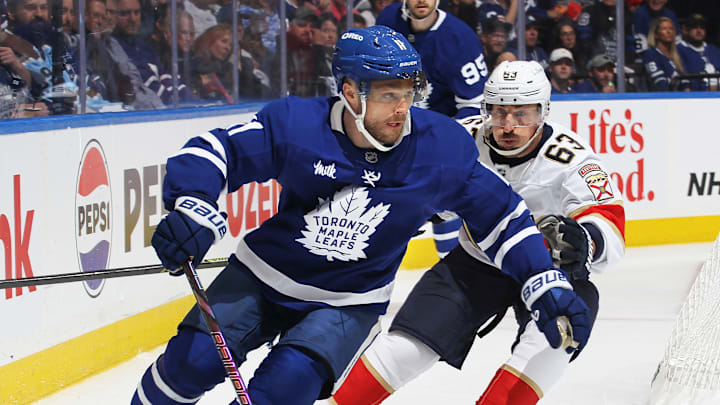Max Domi demonstrated that long-term agreements based on small sample sizes frequently fall through during the majority of his first season while under a four-year, $15 million extension. At $3.75 million annually, the center first appeared to be a good deal, but it soon became an expensive problem.
In 80 games, Domi scored 47 points with nine goals and 38 assists. Those figures initially appear to be comparable to his 2023–24 figures. But the background paints a different picture.
For extended periods, he stopped scoring goals. In a frustrating recurrence of his first season in Toronto, Domi failed to score until December. He only had three goals after 50 games. Such output is unacceptable for a player earning almost $4 million a year.
The decision by Craig Berube to switch Domi from wing to center caused issues right away. Using his vision and passing in the middle of the ice made the coaching change seem like a good idea on paper. Reality wasn't so cooperative. Domi found it difficult to adjust to defensive positioning, face-offs, and the added responsibility that comes with playing center.
Even worse was the picture painted by the underlying numbers. He only scored 20 five-on-five points during the season, which put him ninth among Leafs forwards in terms of points per minute.
That occurred even though they were given sheltered minutes and favorable offensive zone starts. The fact that the team had to restrict his ice time in pivotal moments due to defensive constraints was the most troubling.
He generated 1.41 shots per game, which was a career low. The Leafs were in dire need of their middle-six forwards to provide secondary scoring. Rather, they acquired a player who did not consistently finish when opportunities presented themselves or shoot enough.
Only after Berube finally acknowledged that the position experiment had failed did things start to change. The player Toronto believed they were paying for was unlocked when Domi and Auston Matthews were moved back to the wing. In his final 17 games of the regular season, he scored 15 points, demonstrating the chemistry that first persuaded management to grant the extension.
The only positive aspect of the season was the playoff performance. Domi made a significant contribution in both series, scoring the game-winning goal in overtime against Ottawa and contributing significantly against Florida. These incidents showed that he still has the capacity to influence hockey victories when used appropriately.
Domi's role was made simpler by the Matthews pairing, which is why it worked. His hockey acumen and passing prowess were a wonderful match for Matthews. Berube took too long to figure out what worked and what didn't, so those opportunities were too few during the regular season.
For the majority of the campaign, Domi continued to be a liability on defense. His dedication to playing without the puck was dubious, his face-off percentage was appalling at 45%, and his positioning was erratic. Because of these flaws, the coaching staff had to provide him with ongoing protection.
What little momentum he had gained was shattered by his injury-related eight-game absence in November. It took Domi weeks to regain his timing and confidence after his return, and he never appeared at ease.
The regular season inconsistency was frustrating for a player whose playoff pedigree helped justify his extension. Toronto needed their depth forwards to produce consistently. The team's ability to successfully roll four lines was hampered by Domi's too frequent periods of invisibility.
This was kept from being a total catastrophe by the late-season surge and playoff contributions. Even so, the total amount of work was still far less than what the organization required from a player in the first year of a major commitment.
Final Grade: C-
A player who spent three-quarters of the season proving his detractors correct before displaying flashes of his potential when used appropriately is reflected in this grade. Though the regular season struggles raise valid concerns about whether this contract will hold up over time, the playoff performance gives hope.
Domi gave Toronto enough to prevent them from regretting the extension right away. He was more of a complementary player than the dependable middle-six player they required because of his erratic play and defensive shortcomings. Whether this deal turns out to be a warning about rewarding small sample sizes will be decided over the course of the next three years.
